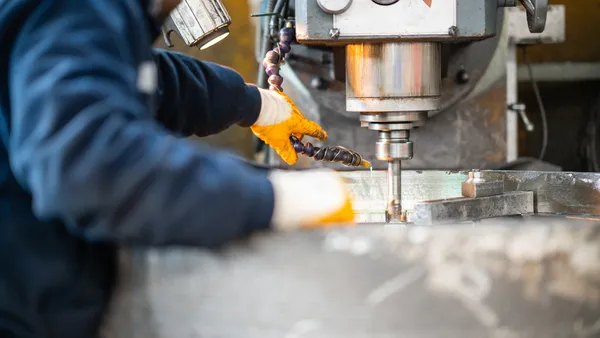Dive Brief:
- Continental’s automotive group has created a new segment to produce semiconductor circuits and support growing chip demand in vehicles, the auto parts manufacturer said Monday.
- The German company will design and verify semiconductors internally, and outsource manufacturing to New York-based GlobalFoundries as part of the effort, according to a news release.
- Continental’s automotive group, recently dubbed Aumovio as part of a pending spinoff, said the fabless unit is a strategic step to bolster operations through savings and efficiencies as chip demand takes off.
Dive Insight:
The global automotive semiconductor is on track to reach about 110 billion euros (or about $128 billion) by 2032, Continental group reported.
This is driven, in part, by growing demand for electric vehicles that require more semiconductors than internal combustion engine vehicles, and advanced driver-assistance systems with features such as adaptive cruise control and blind-spot detection, according to the Research Insights, a market researcher based in India.
As automakers become more reliant on chip technologies, Continental said investment in the sector is imperative to be successful in the long-run.
“The creation of this fabless semiconductor organization will strengthen Continental’s position not only by reducing geopolitical risks but also by the way of becoming more self-reliant in this field,” Philipp von Hirschheydt, a member of Continental’s executive board and CEO of the future Aumovio, said in a statement.
As part of the advanced electronics and semiconductor solutions organization, Continental’s automotive group selected GlobalFoundries as its manufacturing partner. The chipmaker has a manufacturing footprint that spans across the United States, Europe and Asia. The company generated first quarter revenue of $1.6 billion, a 2% increase over last year, as tariff and trade disputes began to pressure prices.
Amid uncertainty, CEO Tim Breen said on a May earnings call that GlobalFoundries has been, and continues to be, bullish about growth in the automotive sector. The company recently transformed all of its fabs to meet “automotive qualified” standards and feels confident about taking more market share in the future, Breen added.
Continental’s automotive group is the latest to team with GlobalFoundries for semiconductor manufacturing. In 2023, General Motors signed a long-term partnership agreement to secure a steady supply of chip components and electronics to its suppliers. Ford also signed a semiconductor deal with GlobalFoundries in 2021 amid a chip shortage that affected vehicle production.
Continental’s automotive group said it formed the semiconductor business as part of its strategy to invest in technology and increase self-sufficiency. The effort aims to establish a resilient supply chain, improve product quality and reduce time to market, according to a release. It also has the potential to enhance the company’s cash flow and generate savings.
In April, Continental AG announced plans to spin off and rebrand its automotive group as Aumovio, which is scheduled to begin operating as an independently listed company in September. It hopes to generate sales of more than 24 billion euros (or about $28 billion) with an adjusted margin range of 6% to 8%.
In addition to vehicle electronics, Continental AG is a producer of tires, chassis, brake and powertrain systems, among other car parts and systems used throughout the automotive industry, according to its website.














